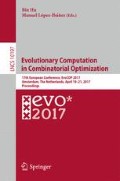Abstract
The firefighter problem is a graph-based optimization problem in which the goal is to effectively prevent the spread of a threat in a graph using a limited supply of resources. Recently, metaheuristic approaches to this problem have been proposed, including ant colony optimization and evolutionary algorithms.
In this paper Estimation of Distribution Algorithms (EDAs) are used to solve the FFP. A new EDA is proposed in this paper, based on a model that represents the relationship between the state of the graph and positions that become defended during the simulation of the fire spreading. Another method that is tested in this paper, named EH-PBIL, uses an edge histogram matrix model with the learning mechanism used in the Population-based Incremental Learning (PBIL) algorithm with some modifications introduced in order to make it work better with the FFP. Apart from these two EDAs the paper presents results obtained using two versions of the Mallows model, which is a probabilistic model often used for permutation-based problems. For comparison, results obtained on the same test instances using an Ant Colony Optimization (ACO) algorithm, an Evolutionary Algorithm (EA) and a Variable Neighbourhood Search (VNS) are presented.
The state-position model proposed in this paper works best for graphs with 1000 vertices and more, outperforming the comparison methods. For smaller graphs (with less than 1000 vertices) the VNS works best.
Access this chapter
Tax calculation will be finalised at checkout
Purchases are for personal use only
References
Baluja, S.: Population-based incremental learning: a method for integrating genetic search based function optimization and competitive learning. Carnegie Mellon University, Pittsburgh, PA, USA, Technical report (1994)
Blum, C., Blesa, M.J., García-Martínez, C., Rodríguez, F.J., Lozano, M.: The firefighter problem: application of hybrid ant colony optimization algorithms. In: Blum, C., Ochoa, G. (eds.) EvoCOP 2014. LNCS, vol. 8600, pp. 218–229. Springer, Heidelberg (2014). doi:10.1007/978-3-662-44320-0_19
Ceberio, J., Irurozki, E., Mendiburu, A., Lozano, J.A.: A distance-based ranking model estimation of distribution algorithm for the flowshop scheduling problem. IEEE Trans. Evol. Comput. 18(2), 286–300 (2014)
Ceberio, J., Mendiburu, A., Lozano, J.A.: Introducing the mallows model on estimation of distribution algorithms. In: Lu, B.-L., Zhang, L., Kwok, J. (eds.) ICONIP 2011. LNCS, vol. 7063, pp. 461–470. Springer, Heidelberg (2011). doi:10.1007/978-3-642-24958-7_54
Costa, V., Dantas, S., Dourado, M.C., Penso, L., Rautenbach, D.: More fires and more firefighters. Discrete Appl. Math. 161(16–17), 2410–2419 (2013)
Develin, M., Hartke, S.G.: Fire containment in grids of dimension three and higher. Discrete Appl. Math. 155(17), 2257–2268 (2007)
Finbow, S., MacGillivray, G.: The firefighter problem: a survey of results, directions and questions. Australas. J. Comb. 43, 57–77 (2009)
Fligner, M.A., Verducci, J.S.: Distance based ranking models. J. R. Stat. Soc. 48(3), 359–369 (1986)
Garca-Martnez, C., et al.: The firefighter problem: empirical results on random graphs. Comput. Oper. Res. 60, 55–66 (2015)
Hartnell, B.: Firefighter! An application of domination. In: 20th Conference on Numerical Mathematics and Computing (1995)
Hu, B., Windbichler, A., Raidl, G.R.: A new solution representation for the firefighter problem. In: Ochoa, G., Chicano, F. (eds.) EvoCOP 2015. LNCS, vol. 9026, pp. 25–35. Springer, Heidelberg (2015). doi:10.1007/978-3-319-16468-7_3
Juan, A.A., et al.: A review of simheuristics: extending metaheuristics to deal with stochastic combinatorial optimization problems. Oper. Res. Perspect. 2, 62–72 (2015)
Kong, J., Zhang, L., Wang, W.: The surviving rate of digraphs. Discrete Math. 334, 13–19 (2014)
Lu, T., Boutilier, C.: Learning mallows models with pairwise preferences. In: Getoor, L., Scheffer, T. (eds.) Proceedings of the 28th International Conference on Machine Learning (ICML 2011), pp. 145–152. ACM (2011)
Mallows, C.L.: Non-null ranking models. Biometrika 44(1–2), 114–130 (1957)
Meila, M., Chen, H.: Dirichlet process mixtures of generalized mallows models. Uncertainty Artif. Intell. 1(1), 358–367 (2010)
Michalak, K.: Auto-adaptation of genetic operators for multi-objective optimization in the firefighter problem. In: Corchado, E., Lozano, J.A., Quintián, H., Yin, H. (eds.) IDEAL 2014. LNCS, vol. 8669, pp. 484–491. Springer, Heidelberg (2014). doi:10.1007/978-3-319-10840-7_58
Michalak, K.: The Sim-EA algorithm with operator autoadaptation for the multiobjective firefighter problem. In: Ochoa, G., Chicano, F. (eds.) EvoCOP 2015. LNCS, vol. 9026, pp. 184–196. Springer, Heidelberg (2015). doi:10.1007/978-3-319-16468-7_16
Michalak, K.: Sim-EDA: a multipopulation estimation of distribution algorithm based on problem similarity. In: Chicano, F., Hu, B., García-Sánchez, P. (eds.) EvoCOP 2016. LNCS, vol. 9595, pp. 235–250. Springer, Heidelberg (2016). doi:10.1007/978-3-319-30698-8_16
Michalak, K., Knowles, J.D.: Simheuristics for the multiobjective nondeterministic firefighter problem in a time-constrained setting. In: Squillero, G., Burelli, P. (eds.) EvoApplications 2016. LNCS, vol. 9598, pp. 248–265. Springer, Heidelberg (2016). doi:10.1007/978-3-319-31153-1_17
Tsutsui, S.: Probabilistic model-building genetic algorithms in permutation representation domain using edge histogram. In: Guervós, J.J.M., Adamidis, P., Beyer, H.-G., Schwefel, H.-P., Fernández-Villacañas, J.-L. (eds.) PPSN 2002. LNCS, vol. 2439, pp. 224–233. Springer, Heidelberg (2002). doi:10.1007/3-540-45712-7_22
Acknowledgment
Calculations have been carried out using resources provided by Wroclaw Centre for Networking and Supercomputing (http://wcss.pl), grant No. 407.
Author information
Authors and Affiliations
Corresponding author
Editor information
Editors and Affiliations
Rights and permissions
Copyright information
© 2017 Springer International Publishing AG
About this paper
Cite this paper
Michalak, K. (2017). Estimation of Distribution Algorithms for the Firefighter Problem. In: Hu, B., López-Ibáñez, M. (eds) Evolutionary Computation in Combinatorial Optimization. EvoCOP 2017. Lecture Notes in Computer Science(), vol 10197. Springer, Cham. https://doi.org/10.1007/978-3-319-55453-2_8
Download citation
DOI: https://doi.org/10.1007/978-3-319-55453-2_8
Published:
Publisher Name: Springer, Cham
Print ISBN: 978-3-319-55452-5
Online ISBN: 978-3-319-55453-2
eBook Packages: Computer ScienceComputer Science (R0)

